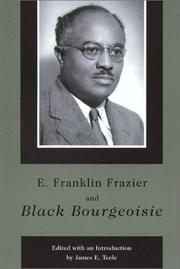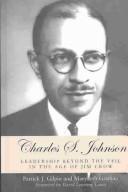| Listing 1 - 9 of 9 |
Sort by
|
Book
ISBN: 1442687320 9781442687325 9780802091222 0802091229 9780802094056 0802094058 9781442691216 1442691212 Year: 2009 Publisher: Toronto
Abstract | Keywords | Export | Availability | Bookmark
 Loading...
Loading...Choose an application
- Reference Manager
- EndNote
- RefWorks (Direct export to RefWorks)
"In African American Pioneers of Sociology, Pierre Saint-Arnaud examines the lasting contributions that African Americans have made to the field of sociology. Arguing that social science is anything but a neutral construct, he defends the radical stances taken by early African American sociologists from unfair criticism by considering the racist historical context of the time in which these influential works were produced." "Examining key figures such as W.E.B. Du Bois, Edward Franklin Frazier, Charles Spurgeon Johnson, Horace Roscoe Cayton, J.G. St Clair Drake, and Oliver Cromwell Cox, Saint-Arnaud reveals the ways in which these authors' radical views on race, gender, religion, and class shaped the emerging academic discipline of sociology. Faithfully and elegantly translated from the original French, African American Pioneers of Sociology is an extraordinary study of the influence of African American intellectuals and an essential work for understanding the origins and development of modern sociology."--Jacket
Sociology --- African American sociologists --- Afro-American sociologists --- Negro sociologists --- Sociologists, African American --- Sociologists --- History. --- United States --- Race relations
Book
ISBN: 1620974371 9781620974377 Year: 2019 Publisher: LaVergne : The New Press,
Abstract | Keywords | Export | Availability | Bookmark
 Loading...
Loading...Choose an application
- Reference Manager
- EndNote
- RefWorks (Direct export to RefWorks)
In these eight piercing explorations on beauty, media, money, and more, Tressie McMillan Cottom - award-winning professor and acclaimed author of Lower Ed - embraces her venerated role as a purveyor of wit, wisdom, and Black Twitter snark about all that is right and much that is wrong with this thing we call society. Ideas and identity fuse effortlessly in this vibrant collection that on bookshelves is just as at home alongside Rebecca Solnit and bell hooks as it is beside Jeff Chang and Janet Mock. It also fills an important void on those very shelves: a modern black American feminist voice waxing poetic on self and society, serving up a healthy portion of clever prose and southern aphorisms as she covers everything from Saturday Night Live, LinkedIn, and BBQ Becky to sexual violence, infant mortality, and Trump rallies. Thick speaks fearlessly to a range of topics and is far more genre-bending than a typical compendium of personal essays. An intrepid intellectual force hailed by the likes of Trevor Noah, Chimamanda Ngozi Adichie, and Oprah, Tressie McMillan Cottom is "among America's most bracing thinkers on race, gender, and capitalism of our time" (Rebecca Traister). This stunning debut collection - in all its intersectional glory - mines for meaning in places many of us miss, and reveals precisely how the political, the social, and the personal are almost always one and the same. --
Women sociologists --- Women, Black --- Sociologists --- African American sociologists --- African American women --- African Americans --- Social conditions --- McMillan Cottom, Tressie. --- United States --- United States. --- Race relations --- History
Book
ISBN: 9782490077229 2490077228 Year: 2019 Volume: 5 Publisher: Paris: B42,
Abstract | Keywords | Export | Availability | Bookmark
 Loading...
Loading...Choose an application
- Reference Manager
- EndNote
- RefWorks (Direct export to RefWorks)
En 1900, lors de l’Exposition universelle de Paris, le célèbre sociologue et militant W. E. B. Du Bois présenta une série de données statistiques dans le but de promouvoir les progrès socio-économiques des Africains-Américains depuis l’abolition de l'esclavage. Les graphiques, diagrammes et cartes exposés rendent compte de leurs conditions de vie et illustrent, littéralement et symboliquement, ce que Du Bois appelait « la ligne de partage des couleurs ». De l’accès à l’éducation aux traces laissées par l’esclavage, ces représentations graphiques – dont le design est aussi remarquable que le contenu saisissant – restituent de nombreux aspects du quotidien des Africains-Américains au tournant du XXe siècle. La Ligne de couleur de W. E. B. Du Bois reproduit pour la première fois l’intégralité de ces représentations en couleurs, les replace dans leur contexte social et met en avant l’avant-gardisme de ces visuels au regard de l’histoire du design graphique. Alors que le travail de Du Bois, annonciateur des luttes à venir, continue à gagner en force et en pertinence, cet ouvrage offre une seconde vie à ces images et montre que les représentations de données statistiques peuvent générer, par l’acte même de faire voir, de nouvelles connaissances.
African American sociologists --- African Americans --- Social conditions --- Du Bois, W. E. B. --- Exposition universelle --- Information visualization. --- Sociology --- African American sociologists. --- History. --- Information visualization --- History --- African Americans - Social conditions - Charts, diagrams, etc. --- Sociology - United States - History --- Du Bois, W. E. B. - (William Edward Burghardt), - 1868-1963
Book
ISBN: 2847970673 9782847970678 Year: 2003 Publisher: Paris : Montréal : Syllepse ; Presses de l'Université Laval,
Abstract | Keywords | Export | Availability | Bookmark
 Loading...
Loading...Choose an application
- Reference Manager
- EndNote
- RefWorks (Direct export to RefWorks)
Sociology --- African American sociologists --- Sociologie --- Sociologues noirs américains --- History --- Histoire --- United States --- Etats-Unis --- Race relations --- History. --- Relations raciales --- Sociologues noirs américains --- American Sociology --- Black People --- 19th-20th Century

ISBN: 0826263496 9780826263490 0826213782 9780826213785 Year: 2002 Publisher: Columbia, Mo. University of Missouri Press
Abstract | Keywords | Export | Availability | Bookmark
 Loading...
Loading...Choose an application
- Reference Manager
- EndNote
- RefWorks (Direct export to RefWorks)
"When E. Franklin Frazier was elected the first black president of the American Sociological Association in 1948, he was established as the leading American scholar on the black family and was also recognized as a leading theorist on the dynamics of social change and race relations. By 1948 his lengthy list of publications included over fifty articles and four major books, including the acclaimed Negro Family in the United States. Frazier was known for his thorough scholarship and his mastery of skills in both history and sociology. With the publication of Bourgeoisie Noire in 1955 (translated in 1957 as Black Bourgeoisie), Frazier apparently set out on a different track, one in which he employed his skills in a critical analysis of the black middle class. The book met with mixed reviews and harsh criticism from the black middle and professional class. Yet Frazier stood solidly by his argument that the black middle class was marked by conspicuous consumption, wish fulfillment, and a world of make-believe. While Frazier published four additional books after 1948, Black Bourgeoisie remained by far his most controversial. Given his status in American sociology, there has been surprisingly little study of Frazier's work. In E. Franklin Frazier and Black Bourgeoisie, a group of distinguished scholars remedies that lack, focusing on his often-scorned Black Bourgeoisie. This in-depth look at Frazier's controversial publication is relevant to the growing concerns about racism, problems in our cities, the limitations of affirmative action, and the promise of self-help."-from Ebsco
African American sociologists --- African American intellectuals --- Middle class --- African Americans --- Afro-American sociologists --- Negro sociologists --- Sociologists, African American --- Sociologists --- Social conditions --- Frazier, E. Franklin, --- United States --- Race relations. --- Race question --- Frazier, Edward Franklin, --- Frazier, Franklin, --- Frėzher, Ė. Franklin,

ISBN: 0791485463 9780791485460 0791460150 0791460169 9780791460153 Year: 2004 Publisher: Albany State University of New York Press
Abstract | Keywords | Export | Availability | Bookmark
 Loading...
Loading...Choose an application
- Reference Manager
- EndNote
- RefWorks (Direct export to RefWorks)
Race, Class, and the Postindustrial City thoroughly explores the scholarship of William Julius Wilson, one of the nation's leading sociologists and public intellectuals, and the controversies surrounding his work. In addressing the connection between postindustrial cities and changing race relations, the author, who is not related to William Julius Wilson, shows how Wilson has synthesized competing theories of race relations, urban sociology, and public policy into a refocused liberal analysis of postindustrial America. Combining intellectual biography, the sociology of knowledge, and theoretical analyses of sociological debates relevant to African Americans, this book provides both appraisal and critique, ultimately assessing Wilson's contribution to the sociological canon.
African American sociologists --- Sociology, Urban --- African Americans --- Urban poor --- Inner cities --- Afro-American sociologists --- Negro sociologists --- Sociologists, African American --- Sociologists --- Social conditions. --- Economic conditions. --- Wilson, William J., --- Wilson, William Julius, --- United States --- Race relations. --- Social policy. --- Race question

ISBN: 0791486060 9780791486061 9780791458983 0791458989 0791458970 0791458989 9780791458976 Year: 2003 Publisher: Albany : State University of New York Press,
Abstract | Keywords | Export | Availability | Bookmark
 Loading...
Loading...Choose an application
- Reference Manager
- EndNote
- RefWorks (Direct export to RefWorks)
A compelling biography of a key figure of the Harlem Renaissance, an eminent Chicago-trained sociologist, and a pioneering race relations leader.
African American civil rights workers --- Civil rights workers --- African American sociologists --- African Americans --- Civil rights movements --- Afro-American sociologists --- Negro sociologists --- Sociologists, African American --- Sociologists --- Civil rights --- History --- Johnson, Charles Spurgeon, --- Fisk University --- Fisk University, Nashville --- Fisk Free Colored School --- Nashville University Center --- Presidents --- United States --- Race relations. --- Race question
Book
ISBN: 9781616897062 1616897066 Year: 2018 Publisher: Hudson, NY Princeton Architectural Press
Abstract | Keywords | Export | Availability | Bookmark
 Loading...
Loading...Choose an application
- Reference Manager
- EndNote
- RefWorks (Direct export to RefWorks)
At the 1900 Paris Exposition, the famed sociologist and civil rights activist W. E. B. Du Bois presented a series of groundbreaking data visualizations advocating for African American progress. These graphs, charts, and maps provided powerful glimpses into the lives of black Americans to convey both a literal and figurative representation of what Du Bois famously referred to as "the color line." From advances in education to the lingering effects of slavery, these infographics - beautiful in design and impactful in content - made visible a wide spectrum of black experience. W. E. B. Du Bois's Data Portraits collets the complete set of infographics for the first time in full color, making their insights and innovations available to a contemporary audience while exploring their context in social and design history. As Du Bois's prophetic work continues to grow in potency and relevance, these images illustrate, in the words of the introduction, how "data might be reimagined as a form of accountability and even protest in the age of Black Lives Matter." -- From back cover.
African Americans --- Information visualization --- Sociology --- African American sociologists --- sociologie --- geschiedenis --- Verenigde Staten --- twintigste eeuw --- Afro-Amerikanen --- grafisch ontwerp --- grafische vormgeving --- grafisch design --- gender studies --- racisme --- informatiedesign --- Du Bois William Edward Burghardt --- 766.022 --- Afro-Americans --- Black Americans --- Colored people (United States) --- Negroes --- Africans --- Ethnology --- Blacks --- Afro-American sociologists --- Negro sociologists --- Sociologists, African American --- Sociologists --- Data visualization --- Visualization of information --- Information science --- Visual analytics --- Social conditions --- History --- Du Bois, W. E. B. --- Du Bois, W. E. Burghardt --- Du Bois, W. E. --- Di︠u︡bua, Uilʹi︠a︡m Ėdvard Burgkhardt, --- Di︠u︡bua, Vilʹi︠a︡m, --- Du Bois, William Edward Burghardt, --- DuBois, W. E. B. --- Du Bois, William, --- Du Bois, W. B. --- Exposition universelle --- Weltausstellung --- Exposition universelle internationale de 1900 --- Bankoku Hakurankai --- Exposição Universal --- Exposition de Paris --- Exposition universelle de 1900 --- Maʻriḍ Pārīs al-ʻĀmm sanat --- Parī Bankoku Hakurankai --- Paris. --- Paris Universal Exposition --- Sen-kyūkyakunen Parī Bankoku Hakurankai --- Verdensudstillingen i Paris --- Vsemīrnai︠a︡ vystavka 1900 g. --- Welt-Ausstellung --- World's Fair --- Paris World's Fair --- Paris Exhibition --- Black people
Book
ISBN: 1282498304 9786612498305 0761841873 9780761841876 0761840044 9780761840046 Year: 2009 Publisher: Lanham University Press of America
Abstract | Keywords | Export | Availability | Bookmark
 Loading...
Loading...Choose an application
- Reference Manager
- EndNote
- RefWorks (Direct export to RefWorks)
This book focuses on the lives of five unique, nationally known sociologists who are among the first African American women to receive doctorate degrees in this discipline:Jacquelyne Johnson Jackson, LaFrancis Rodgers-Rose, Joyce A. Ladner, Doris Wilkinson, and Delores P. Aldridge.
African American sociologists. --- Women sociologists --- Sociology --- Sociologists --- Women social scientists --- Afro-American sociologists --- Negro sociologists --- Sociologists, African American --- History. --- United States. --- AB --- ABSh --- Ameerika Ühendriigid --- America (Republic) --- Amerika Birlăshmish Shtatlary --- Amerika Birlăşmi Ştatları --- Amerika Birlăşmiş Ştatları --- Amerika ka Kelenyalen Jamanaw --- Amerika Qūrama Shtattary --- Amerika Qŭshma Shtatlari --- Amerika Qushma Shtattary --- Amerika (Republic) --- Amerikai Egyesült Államok --- Amerikanʹ Veĭtʹsėndi͡avks Shtattn --- Amerikări Pĕrleshu̇llĕ Shtatsem --- Amerikas Forenede Stater --- Amerikayi Miatsʻyal Nahangner --- Ameriketako Estatu Batuak --- Amirika Carékat --- AQSh --- Ar. ha-B. --- Arhab --- Artsot ha-Berit --- Artzois Ha'bris --- Bí-kok --- Ē.P.A. --- EE.UU. --- Egyesült Államok --- ĒPA --- Estados Unidos --- Estados Unidos da América do Norte --- Estados Unidos de América --- Estaos Xuníos --- Estaos Xuníos d'América --- Estatos Unitos --- Estatos Unitos d'America --- Estats Units d'Amèrica --- Ètats-Unis d'Amèrica --- États-Unis d'Amérique --- Fareyniḳṭe Shṭaṭn --- Feriene Steaten --- Feriene Steaten fan Amearika --- Forente stater --- FS --- Hēnomenai Politeiai Amerikēs --- Hēnōmenes Politeies tēs Amerikēs --- Hiwsisayin Amerikayi Miatsʻeal Tērutʻiwnkʻ --- Istadus Unidus --- Jungtinės Amerikos valstybės --- Mei guo --- Mei-kuo --- Meiguo --- Mî-koet --- Miatsʻyal Nahangner --- Miguk --- Na Stàitean Aonaichte --- NSA --- S.U.A. --- SAD --- Saharat ʻAmērik --- SASht --- Severo-Amerikanskie Shtaty --- Severo-Amerikanskie Soedinennye Shtaty --- Si͡evero-Amerikanskīe Soedinennye Shtaty --- Sjedinjene Američke Države --- Soedinennye Shtaty Ameriki --- Soedinennye Shtaty Severnoĭ Ameriki --- Soedinennye Shtaty Si͡evernoĭ Ameriki --- Spojené obce severoamerick --- Spojené staty americk --- SShA --- Stadoù-Unanet Amerika --- Stáit Aontaithe Mheirice --- Stany Zjednoczone --- Stati Uniti --- Stati Uniti d'America --- Stâts Unîts --- Stâts Unîts di Americhe --- Steatyn Unnaneysit --- Steatyn Unnaneysit America --- SUA --- Sŭedineni amerikanski shtati --- Sŭedinenite shtati --- Tetã peteĩ reko Amérikagua --- U.S. --- U.S.A. --- United States of America --- Unol Daleithiau --- Unol Daleithiau America --- Unuiĝintaj Ŝtatoj de Ameriko --- US --- USA --- Usono --- Vaeinigte Staatn --- Vaeinigte Staatn vo Amerika --- Vereinigte Staaten --- Vereinigte Staaten von Amerika --- Verenigde State van Amerika --- Verenigde Staten --- VS --- VSA --- Wááshindoon Bikéyah Ałhidadiidzooígí --- Wilāyāt al-Muttaḥidah --- Wilāyāt al-Muttaḥidah al-Amirīkīyah --- Wilāyāt al-Muttaḥidah al-Amrīkīyah --- Yhdysvallat --- Yunaeted Stet --- Yunaeted Stet blong Amerika --- ZDA --- Združene države Amerike --- Zʹi͡ednani Derz͡havy Ameryky --- Zjadnośone staty Ameriki --- Zluchanyi͡a Shtaty Ameryki --- Zlucheni Derz͡havy --- ZSA --- ABŞ --- Amerikanʹ Veĭtʹsėndi͡avks Shtattnė --- É.-U. --- ÉU --- Saharat ʻAmērikā --- Spojené obce severoamerické --- Spojené staty americké --- Stáit Aontaithe Mheiriceá --- Wááshindoon Bikéyah Ałhidadiidzooígíí
| Listing 1 - 9 of 9 |
Sort by
|

 Search
Search Feedback
Feedback About UniCat
About UniCat  Help
Help News
News